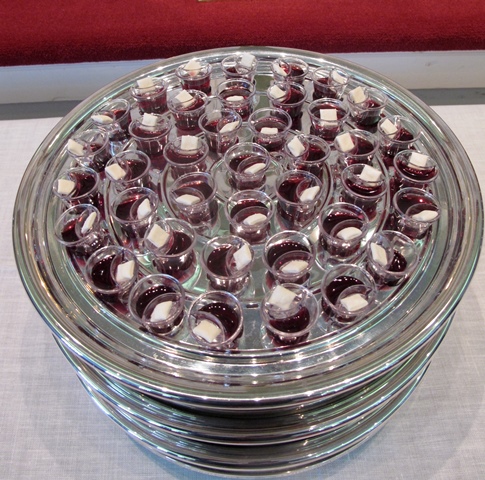By Jeff Brumley
Jason Coker says most members of his Connecticut Baptist church are social drinkers in a culture where alcohol consumption is expected.
“I tell interns who come up here if you are in a social setting and you don’t drink… they assume you are an alcoholic (in recovery),” said Jason Coker, pastor of the CBF-affiliated Wilton Baptist Church in Wilton, Conn.
But in no way would that translate into an agreement to start using wine during the monthly communion service, he said. “A lot of churches in our area use wine, but … the tradition in this church for 45 years has been to use grape juice.”

Such traditions were briefly challenged during CBF’s General Assembly in June, when a breakout session on believers’ baptism turned into a discussion about the Lord’s Supper.
‘Drop of a temperance hat’
Discussion leader Bill Leonard, an author and church historian at Wake Forest Divinity School, was asked why Baptists don’t use wine in the rite. He immediately proclaimed “I long for the day” when they do.
Most Baptists and other Protestants, except Episcopalians and Lutherans, switched from wine during the temperance movements of the 19th and 20th centuries.

But if Baptists today are going to argue – as some do – for full immersion baptism and re-baptize new members from other Christian churches, then they should embrace the biblical standard of wine in the supper, Leonard said.
“Here we are talking about retaining immersion, but we gave up wine at the drop of a temperance hat,” Leonard said.
Leonard has previously noted that Primitive Baptists stuck to wine while the rest were abandoning it.
But Leonard’s longing is likely to remain an unrequited one, at least for the foreseeable future.
‘No movement’
Recent tradition is partly responsible for that, and so is a genuine concern for recovering alcoholics, said Curtis Freeman, a research professor of theology and director of the Baptist House of Studies at Duke University.

Romans chapter 14 is often cited in making that argument because it instructs Christians to accommodate weaker brothers and sisters, he said.

Freeman speculated that Fellowship Baptists may be open to the idea of returning to wine in worship, compared to other Baptist traditions. And younger Baptists involved in the emergent church also are open to it.
“But there is no movement in Baptist life to return to it,” Freeman said.
‘Habits hard to break’
It’s even a tough sell in congregations where members have experimented with communion wine and liked it, said Rodney Kennedy, senior pastor at First Baptist Church in Dayton, Ohio.
For five weeks in February and March, the American Baptist church hosted an Episcopal parish whose building was being renovated. That act of hospitality required FBC to provide wine stations for the Anglican visitors in addition to the usual grape juice. Kennedy said he was amazed to see how his congregants responded.

“Almost everybody went with the real thing,” he said.
Kennedy describes himself as a “small c, small b Catholic Baptist” who would switch to wine in a heartbeat.
“But it would be a pretty controversial switch,” he said. “There are people who drink wine (socially) but if you ask them to change the church’s policy, they would be reluctant, to say the least.”
That, even though Scripture is clear Christ used wine in the Last Supper, he added. “Habits are hard to break even if they haven’t any biblical sense about them.”
‘Fundamentalist mindset’
Even so, some can see it happening in the next one or two generations.
One of those is Troy Dixon, pastor of Normandy Park Baptist Church, a Southern Baptist congregation in Jacksonville, Fla.
Dixon said he abstains from alcohol to keep from scandalizing others.

“We are still under the grip of that fundamentalist mindset where any alcohol is taboo, forbidden, of the devil,” Dixon said.
“But around the periphery” there are others rejecting that mindset, he said. He noted that some larger SBC churches, especially in the Northwest, have experimented with microbrewery classes to draw in the unchurched.
It all makes him think future generations of Baptists may embrace social drinking and, eventually, wine for communion – at least in some parts of the country.
“I could see some groups over the next generation beginning to embrace it.”
